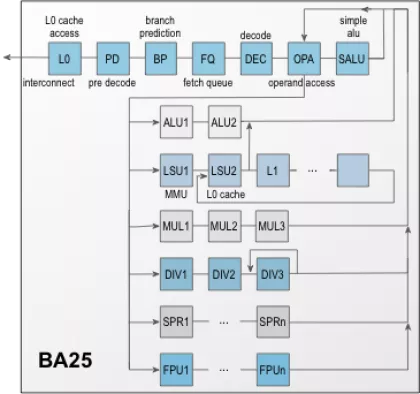The BA25 is a 32-bit processor for demanding systems running applications on general-purpose operating systems such as Linux and Android. The high-performance BA25 processor runs at high clock frequencies yet has a smaller silicon footprint than most competing application processors (e.g., over 1100MHz and from 145k sq. um in TSMC 28nm HPM, including the FPU, and excluding SRAMs).
This royalty-free 32-bit processor core is binary-compatible with other members of the silicon-proven BA2x processor family. Its BA2 instruction set is relatively simple and extremely compact, offering system area and energy savings benefits. Programing is facilitated with the included C/C++ tool chain, Eclipse IDE, architectural simulator, and ported C libraries, RTOSs, and OSs.
The seven-stage pipelined architecture runs at high frequencies and further enhances performance by supporting out-of-order execution and branch prediction. An optional IEEE 754 compliant floating-point unit accelerates floating point computations.
The BA25 processor uses two-level data and instruction caches—with L0 running at the CPU’s clock frequency and L1 running at half that—and a two-level memory management unit. The size and associativity of the caches and MMU are configurable at synthesis time. The system interface uses two AMBA® AXI4™ buses, one for data and one for instructions, both of configurable data width. Two tightly-coupled quick memory (QMEM) buses allow fast access for time-critical code and data, and can be used for inter-core communication in a multi-core architecture.
The energy efficiency BA25 enables power management with clock gating and power shut-off of unused units, and through software and hardware control over the clock frequency of the CPU and buses. Wake-up from sleep mode is triggered by an interrupt issued by the embedded tick-timer or by an external source.
32-bit Application Processor
Overview
Key Features
- High Performance 32-bit CPU
- Seven-Stage Pipeline
- Out-of Order Completion
- Sophisticated Branch Prediction
- Optional Floating Point Unit
- 2.51 Coremarks/MHz
- 1100+ MHz on TSMC 28nm HPM
- Efficient Power Management
- Dynamic clock gating and power shut-off of unused units
- Software- and hardware-controlled clock frequency
- Wake-up on tick timer or external interrupt
- Fast & Flexible Memory Access
- Separate Instruction and Data Caches and MMU
- AXI4 data & instruction buses (32-, 64- or 128-bit) with 4 GBytes direct addressable space on each bus
- Tightly coupled Quick Memory (QMEM) interface for fast and deterministic access to code and/or data
- Two-Level Cache and MMU
- L0 cache running at core frequency and L1 cache running at half the core frequency
- 1–16 Kbytes L0 caches, up to four-way set associative
- 32–512 Kbytes L1 caches, up to four-way set associative
- L0 MMU with up to 32 four-way associative entries
- L1 MMU with up to 2048 four-way associative entries
- Optional Integrated Peripherals
- Vectored Interrupt Controller
- Microcontroller peripherals such as GPIO, UART, Real-Time Clock, Timers, I2C, and SPI
- Memory controllers, interconnect IP, and more
- Easy Software Development
- Non-intrusive JTAG debug/trace for both CPU and system
- Complex chained watchpoint and breakpoint conditions
- BeyondStudio™ complete IDE for Windows or Linux under Eclipse
- Ported libraries and operating systems
Block Diagram

Applications
- The royalty-free, high-performance BA25 processor core is suitable as the main system processor in a multitasking environment and is a competitive choice for designs running full operating systems such as Linux or Android.
Deliverables
- The core is available for ASICs in synthesizable Verilog source code or for FPGAs in optimized netlists.
- It includes everything required for successful implementation: extensive documentation, a testbench, a sample SoC design, sample synthesis and simulation scripts, and the BeyondStudio™ Eclipse-based software development IDE for Windows and Linux.
- Reference designs on FPGA boards are also available; contact CAST Sales for information.
Technical Specifications
Maturity
Production Proven
Availability
Now
Related IPs
- 32-bit RISC Processor To Deliver High Performance In Low-Cost Microcontroller Applications
- RISC-V ARC-V RMX-100 Ultra-low Power 32-bit Processor IP for Embedded Applications
- 16/32/64-bit Application Adaptive Processor
- LatticeMico32 Open, Free 32-Bit Soft Processor
- Highest code density, Low Power 32-bit Processor with optional DSP
- 32-bit Basic Application Processor